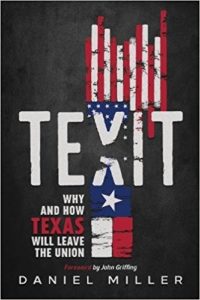 Daniel Miller is president of the Texas Nationalist Movement, an organization that works to acheive Texas Self-Rule. He recently published a book on this very topic: Texit: Why and How Texas Will Leave the Union. I purchased the book on pre-order and it was delivered immediately after it became available.
Daniel Miller is president of the Texas Nationalist Movement, an organization that works to acheive Texas Self-Rule. He recently published a book on this very topic: Texit: Why and How Texas Will Leave the Union. I purchased the book on pre-order and it was delivered immediately after it became available.
First of all, the book is well-written, demonstrating Miller’s clear, accessible, and directed communication skills. He takes some complex concepts and does present them in undertandable ways, which will be beneficial to readers who might not have spent lots of time pondering them. At no time did I find myself wondering what he was talking about or thinking that he had drifted off topic.
The subject is one that he has spent over 20 years expounding, so it is to be expected that he is knowledgeable, and the book demonstrates that. The book is broken into 9 chapters, not including an introduction and some final content, such as glossary and bibliography. The final two chapters (8 and 9) are brief and look more towards what comes after Texas might become independent, and are not really the true focus of the book, he leaves those subjects for future works. It is the first seven chapters that really matter here.
Chapter one sets definitions. He explains what “Texit” is (using the word coined to reflect the “Brexit” vote that took place in the UK in 2016). The chapter expains the background of secession movements in Texas, the types of people who support it, as well as how independence movements have been viewed in recent decades. It sets the stage for his exposition in the rest of the book.
Chapter two is worth the price of the book, all by itself. This chapter focuses on the intended structure of the United States, with one of the most precise and clear presentations of federalism that I have seen. He argues that the governmental structure of the United States no longer matches what was originally intended, and to what Texas agreed to join in 1845. Seriously, this chapter is a must read for anyone who thinks the founding fathers intended “these” United States to look anything like the leviathan in D.C. today.
Chapters 3-7 all focus on the nitty gritty of gaining independence. Miller addresses the reasons why Texans might want to leave the Union. He covers the most common excuses people present to dismiss the movement, and provides some good responses to them, showing that they are not really effective reasons to remain in a failed union. Further, he points out the obstacles that really stand in the way and how to overcome them. This leads to the path that should be taken, in the form of a referendum, wherein Texans themselves determine their fate. Chapter 7 then looks at other common issues that a newly idependent Texas would have to deal with (Social Security for the elderly, trade, etc.).
All in all, the book is worthy of your time. It does speak to an important issue that most Americans will face, in one way or another. There is  no doubt that the current situation is not going to last forever, and there will be continuing calls for separation from the United States, not only from Texas, but other regions, as well. Miller offers a peaceful way to make this happen. I would agree with the vast majority of the book and its argumentation.
no doubt that the current situation is not going to last forever, and there will be continuing calls for separation from the United States, not only from Texas, but other regions, as well. Miller offers a peaceful way to make this happen. I would agree with the vast majority of the book and its argumentation.
My main concern, and true disagreement, is that Miller appears to be a civic nationalist, holding up that anyone can be a Texan, if they just have a “Texas mentality.” I would argue that most people in the world can never be Texans. He posits that Texans have no problem with immigration, as long as it is controlled, and I will confess that such a system is preferred over what we have now, but the reality exists that being a Texan (or Alabamian, or any other group) is more than where one lives and thinks. There is a shared history that adheres us to a specific group. There are many Texans that would prefer that there be no immigration, and most of those who have immigrated to the state (and perhaps future Republic) over the past 50 years should go back from whence they came.
Regardless of that quibble, Miller’s goals are worthy and good. He has provided a good resource, not only for Texans who yearn for political independence, but for those of any place who desire the same. The arguments he presents are applicable in many settings. I recommend the book as a tool to help groups to find a voice to exert their sovereignty.
You would do well to buy the book and read it.

Book Review: Texit
6 Comments
Leave a Reply
Latest from Culture

Dangerous Left Wing Rhetoric
On Saturday, July 13, 2024, an assassin came within inches of murdering Donald Trump on a live broadcast. Democrat talking heads immediately split into two camps: some said Trump staged the shooting

Movie Review: Streets of Fire
Underrated. Yes, the acting is forced, the lines are flat, the sets limited, but it makes up for it by being awesome. It's more of a modern Western than anything.

Calvin Coolidge on Independence Day
Speech Given July 1926 We meet to celebrate the birthday of America. The coming of a new life always excites our interest. Although we know in the case of the individual that

Edward the Black Prince
"Valiant and gentle...the flower of all chivalry in the world at that time.”

The Weimar Years – Part 5
Summary of the German Revolution, 1918-1919.




On the subject of being a “civic nationalist” and holding a “Texas mentality.”
I was born and raised in California. Thank God I was able to leave for Idaho a number of years back. I clearly have more of an “Idaho mentality” than a “California mentality” (I hold a passionate disdain for California. When people ask me why I moved to Idaho, I simply say, “California,” and they all nod knowingly.)
We encounter far more people in Idaho that came from somewhere else than are native Idahoans. Some of the natives resent the influx of “foreigners” into the state, but these tend to be those of an advancing age, who were adults with families during the 1980s. The “shared history” of the state is what exists now, not what existed then. Perhaps Texas is different to some degree (I sense many identify proudly as “Texans” whereas fewer would be passionately “Idahoan.”) but I have many colleagues in Texas who are native-born and toxic in the idea department – supporting SJW causes and liberal to the core.
I can understand the “they have to go back” concept, but who decides who the “they” are? Idaho was initially settled by various European groups, English, German, Irish, then shortly after came the Basque. It’s easy to see that there’s a shared cultural and ethnic component to the Basque here, but the “Californians?” Or the “Coloradans?” Doesn’t exist. I’m not a Californian in any sense, other than that is the location of my birth. Do the Basques have to leave because they arrived 20 years later than the rest?
Again, Texas may be a unique situation based on their existence as a republic.
Just thought of something – we have got the native Idahoans outnumbered now. I guess we win and get to stay.
We actually discussed some of these things in prior posts here, mostly about this time last year, but generally, our argument is that if we come from a European background, there is a good chance of assimilation, assuming the arrivals are not overwhelming in number. Honestly, it is a nitpicky argument in this case with Mr. Miller, as he and I would agree on the vast majority of how to accomplish these things.
Also see
http://revisionisthistory.com/episodes/21-divide-and-conquer
It is a mystery, but the punchline is toward the end
“There is a shared history that adheres us to a specific group.”
Bingo. This is why (horror of horrors) I would argue that “magic dirt” works, given sufficient time.
There was a time the Romans fought the Latins, rather than being them. There were centuries that the British fought the English, rather than being them. It is time together, not blood, that creates nations. A people may have the same blood (think ‘Germanic tribes’ or even Canadians-and-Australians) but given time apart they become separate nations.
Those who mock “civic nationalism” conflate three “nations”. There is the nation of blood, to be sure. But there is also the nation of law and the nation of culture, of history.
Regarding the first, when I look at my ancestry.com results, I am English*. I speak English, assert the historic rights of Englishmen… I’m even protestant, though not Anglican. If anyone has cause to be called an Englishman, it is I: my straight-line male ancestor landed at Plymouth in 1629. My family was captured in the Deerfield Raid, fought the Quebecois in the French and Indian War. Subjects of the Crown, they fought beneath its banner and from their wounds flowed English blood.
Yet if anyone has cause to be called an American, it is I: My family was among those who routed the British at Cowpens. We rode with — hell, commanded — the Kansas Red Legs, we were doughboys, we crawled up Hamburger Hill. We fought beneath the Stars and Stripes, and from our wounds flowed American blood.
When did the Americans genetically secede from England? My people were English colonists, then with the Treaty of Paris (1783), they were Americans. If you are only your ancestry, your blood, then there are no Americans. We are just Englishmen who planted a funny flag on the moon.
But if winning a war can make one no-longer-English, if a treaty can make you American, then so can passing a constitutional amendment or taking an oath.
The argument over who is a ‘real American’ is the same as the argument over who might be a real Texan or, given sufficient** devolution, a real Kansan or Idahoan. A real Texan, I would argue, is one who is accepted by his fellow Texans as ‘one of them’, whatever his origin. It’s the same with a real American. Americans are who Americans say we are.
Some have to go back, because they are not Americans. But that will be measured by whom Americans decide ‘belong’ elsewhere, not by blood alone.
* With other European mixed in, but 0% of my results was North American.
** rather, inevitable.
I talked about nationalism some last year. I am not sold on magic dirt, even over long periods of time. Perhaps if the mingling groups are sufficiently similar, but if from wildly divergent groups, I do not see it happening.
https://www.menofthewest.net/black-white-red-yellow/
I have actually read several books by many different authors, from King, Cussler, and Patterson who are remarkable in their own right. However none of those listed above have actually captivated me as much as this book has. I also recommend to read https://bit.ly/2LFzZSO Winnona Theodor . P.S: I like this website. Thank you